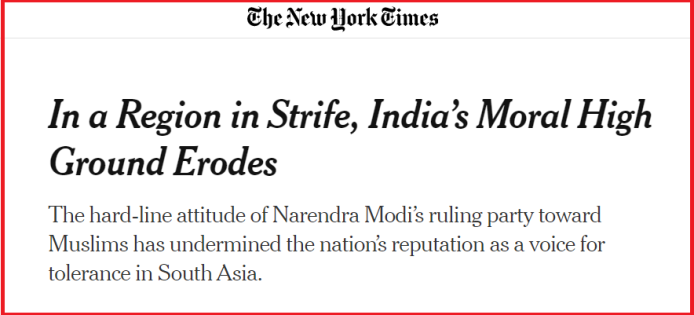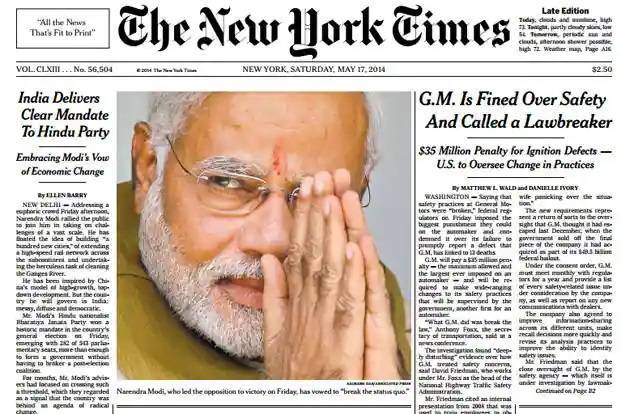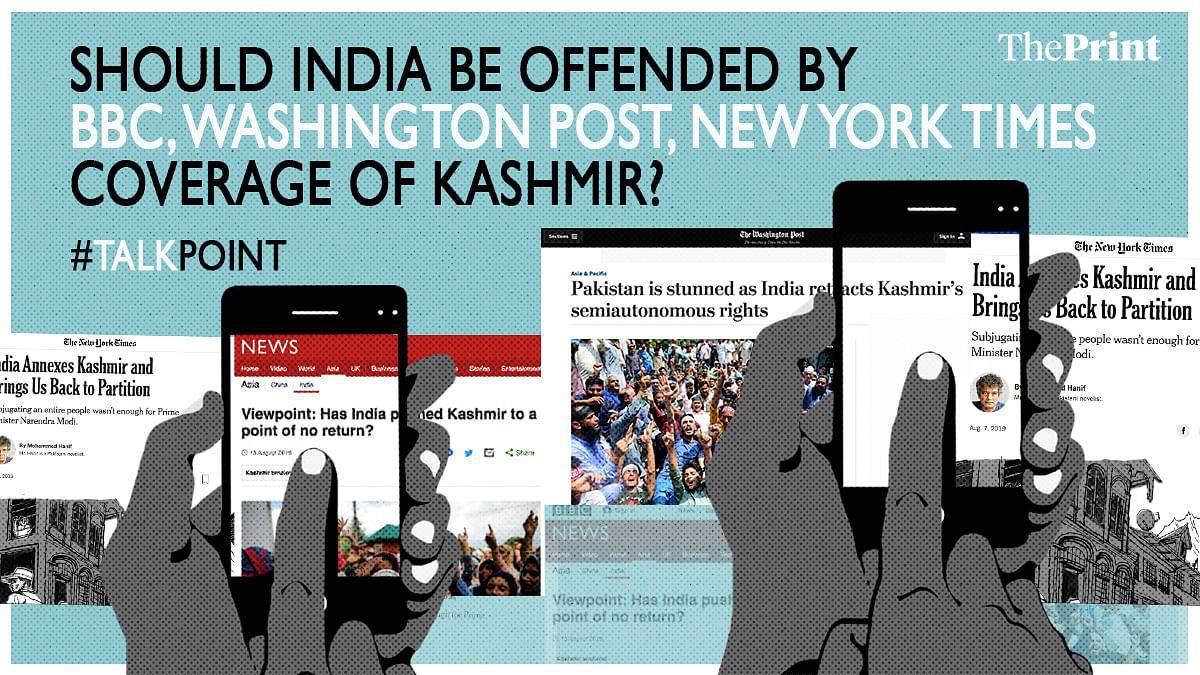Global elite has always loathed a confident India: Earlier NYT & BBC had declared Nehru intolerant

For years now, the New York Times has been accused of being brazenly Hinduphobic and anti-Modi in the content that is published on its website. These dubious credentials were reaffirmed when few months back they published an entry-level job requirement on their website and LinkedIn.
While publishing job requirements is a routine affair, what caught the attention was the specific requirements—being anti-Hindu and anti-Modi—mentioned in the description. The job posting was for that of a South Asia Business Correspondent in New Delhi.
The New York Times was unabashedly seeking applications from writers who were ideologically aligned against the Modi government and possessed skills required to carry forward its legacy of anti-Modi and anti-Hindu propaganda.
 |
While New York Times is looking for someone who is anti-Modi and anti-India, the media house is already publishing such content for years. In fact, ever since Narendra Modi became the prime minister of India, the attacks against Hindu culture in the New York Times have only intensified. With the arrival of PM Modi, the New York Times has shunned its subtle attempts in propagating its anti-Hindu propaganda and assumed a more aggressive approach to allow its platform to host Hinduphobic content.
Now consider this article that was published in The New York Times a couple of days back.
 Article by New York Times |
And now, read this.
“With his invasion of Goa Prime Minister Nehru has done irreparable damage to India’s good name and to the principles of international morality.” — The New York Times, Dec 19, 1961.
Although this is no laughing matter, I know some of you might be tempted to burst out laughing. Could it be that the New York Times suffers from such a lack of imagination that they have not changed their language one bit in sixty years? And on a more serious note, do global elites always get so angry whenever India tries to deal with the world on its own terms? Yes, and yes.
That extract is from a particularly infuriating piece in The New York Times titled “India, the Aggressor,” published in December 1961. Its language is basically the same as that being used to attack PM Modi today, whether on the matter of Article 370, or the ghost of “intolerance.”
First, some background. In 1947, when India gained independence, Goa could not become part of the new nation because it was a Portuguese colony. For over a decade, the Indian government tried to reason with Portugal, to convince them to let go of their colony. A non-violent resistance movement grew up within Goa, seeking union with India.
 |
But Portugal said NO. For those wondering, Portugal at the time was ruled by the crazy Salazar. You can’t call Salazar a dictator because that would hurt his feelings. So, from 1932 to 1968, Salazar ruled over Portugal, calling for elections every four years. And in each of these elections, his ruling National Union party won exactly 100 percent of the vote. Not 99 percent, not even 99.9 percent, but one hundred percent. Even Kim Jong Un settles for just under 100 percent, but not Salazar! So that’s the kind of person India was dealing with.
Finally, on Dec 17, 1961, India’s patience ran out. The Indian military lifted a finger, and in a day or so, the Portuguese fled.
Whose side would the New York Times take in this conflict? The side of democratic India? Or the side of the white colonial power, that too ruled by a crazy dictator.
Of course, The New York Times took the side of the white colonial power. Because that’s what global liberalism always was. And still is. Anybody who reveres The New York Times should know this story. We always heard that the West adored Nehru and they really did. As long as he showed India as a land of snake charmers, they loved him. As long as India with its policy of “non-violence” was no threat to anyone, they loved him. But if Nehru asserted India’s rights, they were ready to be just as harsh with him.
How harsh? After the liberation of Goa, President John F Kennedy told the Indian ambassador that
“People are saying that the preacher has been caught coming out of the brothel.“
 |
Ouch! But JFK’s words are very revealing in how the global elite wants India to behave. They love India as the preacher. Not that they listen to the preacher’s words. Portugal was a client state of the US (and still is). The US could easily have prevailed on them to do the right thing. But they didn’t do that. They love India as the penniless preacher saying nice things in their ear.
And no, the bitterness over Goa is not something that the West forgot in a hurry. Here is the Washington Post over twenty years later, in 1983!
“Goa, of course, is the former Portuguese colony that preachy, “nonviolent” India grabbed in 1961 in what still lives as a world-class instance of post-colonial hypocrisy. It would have taken a special perversity for Commonwealth dignitaries to relax at the scene of India’s permanent conquest and… “
Just read their words – permanent conquest, post-colonial hypocrisy.
That article was written in 1983! Now somebody remind me, please. Isn’t this the same Washington Post that pays sepoys in India even today to write on how India is a mean fascist state? Their words have not changed one bit. Their hatred for India has not changed one bit. Only their sepoys have aged and have been replaced by new ones.
And wait till you find out how “intolerant” Nehru was:
“Our correspondent adds that the Hindu half of the population is highly delighted about the change.“
That’s the BBC in December 1961. Spreading lies all around the world about the patriotism of Christians of Goa. Painting India as a Hindu majoritarian state looking to oppress religious minorities. How familiar! How similar to what they are doing today.
And all this from the BBC, from The New York Times and from The Washington Post, for what? On behalf of a crazy dictator from Portugal! Can you trust the motives of these ‘news’ organizations today?
The advantage of bringing up this sixty-year-old incident is that it gives us clarity. It tells us what the global elite is and how they think about India. It helps us see beyond the partisan fog that always clouds the present. Nehru was not from BJP nor RSS. But when he tried to assert India’s natural rights, they hated him for it. They tried to label him as an aggressor and intolerant of religious minorities. It’s the same as what they are doing to Modi today.
The global elite does not hate PM Modi because he is from BJP. They do not hate PM Modi because they consider him intolerant. Even if he was, the global elite would not care. They hate him because he is an Indian who loves India and wishes for India to assert its rights. Clarity is important.
References:
opindia.com - Abhishek Banerjee
 Support Us
Support Us
Satyagraha was born from the heart of our land, with an undying aim to unveil the true essence of Bharat. It seeks to illuminate the hidden tales of our valiant freedom fighters and the rich chronicles that haven't yet sung their complete melody in the mainstream.
While platforms like NDTV and 'The Wire' effortlessly garner funds under the banner of safeguarding democracy, we at Satyagraha walk a different path. Our strength and resonance come from you. In this journey to weave a stronger Bharat, every little contribution amplifies our voice. Let's come together, contribute as you can, and champion the true spirit of our nation.
 |  |  |
| ICICI Bank of Satyaagrah | Razorpay Bank of Satyaagrah | PayPal Bank of Satyaagrah - For International Payments |
If all above doesn't work, then try the LINK below:
Please share the article on other platforms
DISCLAIMER: The author is solely responsible for the views expressed in this article. The author carries the responsibility for citing and/or licensing of images utilized within the text. The website also frequently uses non-commercial images for representational purposes only in line with the article. We are not responsible for the authenticity of such images. If some images have a copyright issue, we request the person/entity to contact us at This email address is being protected from spambots. You need JavaScript enabled to view it. and we will take the necessary actions to resolve the issue.
Related Articles
- Snappy wisecrack of Rahul Gandhi on ‘Hindu vs Hindutva’ and his frequent trips to temples and other confusing steps
- ‘Breast Tax’ to cover their breasts: A False Story to Attack Hindus based on a pseudo-historical legend
- Time for Jashn-e-Riwaz kinda response as Sri Ganesh portrayed as "Gangsta" by E-Commerce firm Pixels to sells products
- Liberal Hindu and YouTuber Abhisar Sharma suffers another meltdown within 48 hours, laments media focus on PM Modi while focusing on PM Modi
- Knowing no boundary for hate, liberals descended on social media platforms to celebrate the death of legendary singer Lata Mangeshkar, calling her a ‘fascist’ and a ‘vile sanghi’
- ‘Casteless Hindu’ is Not a Paradox. It is The keystone of ‘Ghar Wapsi’ and Hindutva
- Saba Naqvi infers that re-settling Kashmiri Pandits in the valley decades after the genocide was perpetrated against them by Islamic terrorists is a part of the ‘Hinduisation’ project: Mirrors Jihadis and Islam extremists
- Kerala govt. employees to pay Jizya tax on undertaking Sabarimala pilgrimage
- Maligning of India by British Raj since the 1800s
- Netflix CEO Reed Hastings expressed his ‘frustration’ over its poor performance in India after shares plummet by 21%, netizens were quick to show the mirror to the streaming platform and blamed its ‘woke bullsh*t’ content
- Busting the myth of “glories” of the Mughal Empire and its economic superiority as fantasized by Indian Marxist and Liberal historians
- Dangerous plots of Khalistan uprising and Hindu genocide, hurling abuses to Hindu Gods, arrest of Hindus for ‘blasphemy’ when retaliating - The menacing truth of underbelly of Clubhouse
- 'Enough of Siva, Parvati and Sri Krishna - 3,000 years of that and where’s that got us— slavery, poverty': Another gem from Nehru
- "Modi hell-bent on re-creating the lost Hindu kingdom or Hindu Rashtra”: Propaganda of demonizing India over the fake narrative of ‘Muslim persecution’ set in motion again by International Toolkit
- The former RAW officer claims that Ex Muslim Vice President Hamid Ansari while serving as an Indian Ambassador to Iran exposed the RAW set-up in Tehran endangering the lives of RAW unit members













